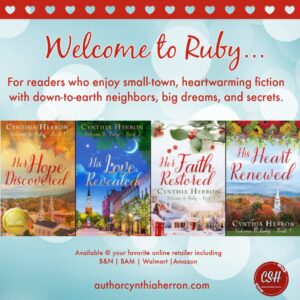By Cynthia Herron @C_Herronauthor
Did you ever set out on a road trip or a vacation and somewhere along the way miss a turn and realize you were lost?
Maybe that’s why I don’t drive in big cities (says the woman who recently moved to a suburb of a Midwest city that boasts an 800,000+ population). Turning around in the middle of a six-lane freeway is a bit of a stretch when there’s traffic crisscrossing in front of me in all directions.
Today, thanks to a variety of bells and whistles at our disposal, losing our way is a rarity. From time to time, though, it can still happen. And to be honest, even when we think we’re traveling in the right direction, occasionally, we misjudge and have to navigate a new course.
Writers realize that changing direction is a way of life. As we craft our stories, we learn what paths to take and which ones to steer clear of. It’s a trial by fire discovery—a maturity that’s gained over time.
Novice writers may roll full steam ahead using whatever method suits them or whatever trend seems to be the next big thing. The seasoned writer knows when to pause, reflect, and redirect if something within the story isn’t working. I believe it’s writer’s intuition, which, for me, is closely linked with a nudge from the Holy Spirit. It’s that gut feeling we have as our confidence grows in our craft.
Like others, I cringe when I think about those first manuscripts I initially penned.
The writing was weak, the characters boring, and the plots predictable. I hadn’t yet mastered the art of self-discipline or the necessary writing skills to effectively craft a compelling story. My “roadmap” was lacking.
Recently, I watched a few episodes of the old Twilight Zone series. These television episodes were dated from the early to mid-1960s and, of course, by today’s standards they’re considered archaic. My father loved them!
I think the main reason the show became such a hit at the time was because of the unique spin that was always integral to the plot.
The viewer really did feel as though he was in another dimension. And if you’ve ever watched any of the old episodes, sometimes the problems or dilemmas were resolved and sometimes they weren’t.
Often, the viewer was left with a what if cliffhanger at the very end. One could surmise what might have happened. Many times, however, the meanies and guilty parties met with punishment fitting their personalities and ne’er-do-well ways.
Despite the limited sets, the contrived dialogue, and the generational stereotypes, the plots intrigued. This show worked. The writer(s)––I believe it was mainly Rod Serling––tapped into scenarios that we so often think about, but don’t truly believe could happen. He played mind games with the mundane and substituted the fantastic for “normal.”
Fast forward through the decades. A lot has changed.
However, one thing remains the same. A great story is what draws us. A good plot will outshine all the special effects, and sometimes even the characters, when it’s conveyed well.
Consider the box office bombs that have commanded megawatt stars and cost millions of dollars to make. Even stellar performances and fancy bells and whistles can’t overcome a bad story.
Like anything we learn to do well, we must examine which methods work best and then implement them. It’s often a lengthy exercise in diligence, patience, and perseverance, but one that reaps benefits down the road.
9 Practical Tips to Enhance Our Storytelling @C_Herronauthor #ACFW #writingtips #writing Share on XHere are some things we can do to enhance our writing.
Use a critique partner/group. Feedback isn’t just nice— it’s essential. First readers will catch grammatical errors, timeline inconsistencies, and plot snafus when we won’t because of our proximity to our project.
Join writers’ organizations. Writing is a solitary experience. Camaraderie with fellow authors is important. Writers “get” other writers when no one else does. It’s also a must if we want to grow our craft, stay abreast of industry news, and also make new friends along the way!
Read our work aloud. If it sounds especially silly, it may be. Unless we have a God-given comedic flare, perhaps humor isn’t our finest point.
Study people. Often, truth is stranger than fiction. Just know when to draw the line. I’ve gleaned tons of story/dialogue ideas just from observing others and listening to snippets of conversations.
Maintain consistency in characters. If Sally Sue is a kind-hearted do-gooder through three-fourths of our novel, we don’t want her to suddenly change course during the last one-fourth of our story and make her into a hard-hearted Hannah. Unless our character is set to have a mental collapse of some sort, this type of thing isn’t believable, and that scenario would work best earlier in our story anyway.
Careful on the euphemisms. Sometimes, for instance, in faith-based fiction, we must rely on euphemistic phrases. Specific words aren’t acceptable or appropriate. Too many euphemisms, however, can seem over-the-top or humorous when that’s not the intent at all.
Don’t make our Christian characters too wimpy. Unless that’s an intentional character trait, to portray Christians as scaredy-cat panty-waists is a poor generalization. On the other hand, don’t paint them as pompous, pious, or too “holier-than-thou.” That’s not realistic either. There has to be a happy medium, in other words.
Read books. Lots. Especially in the genre we write. We don’t want to try to emulate our favorite authors, but rather, use our own voice instead. If we write in such a way that’s not truly who we are, it’ll be uncomfortably clear.
Bolt from the starting gate ready for action. And keep it up during the beginning, middle, and end of our story. Even during those quieter lulls, right before conflict or just after, there should be the sense of “Wow! What’s next?” We want our readers to keep turning those pages, or at the very least, salivate over what’s yet to come!
***
Can you think of an example of an old movie/T.V. series that, despite the disadvantage of modern-day film techniques, etc., had a compelling theme or plot? One that you’re bound to never forget?
What other factors make a story work?
 As an avid encourager and lover of the underdog, Cynthia Herron writes Heartfelt, Homespun Fiction from the beautiful Midwest. Her work is represented by WordServe Literary. Connect with “Cindy” on X, Facebook, Instagram, and Pinterest.
As an avid encourager and lover of the underdog, Cynthia Herron writes Heartfelt, Homespun Fiction from the beautiful Midwest. Her work is represented by WordServe Literary. Connect with “Cindy” on X, Facebook, Instagram, and Pinterest.

Comments 8
Great tips, Cynthia, thank you. Twilight Zone was fantastic! Yes, I can think of an old movie that I’ll never forget. It had a complex plot with a lot of internal struggles (so the actors were sorely taxed to convey all that): Hush, Hush, Sweet Charlotte.
Ooh! I haven’t watched that one in years! Great mention. May need to re-watch!
HI Cynthia. I see so many themes in the old westerns that can be used in Christian fiction! I have a list of at least fifty of them I have gathered from watching old episodes of my favorite TV western – Gunsmoke. I enjoyed your article. Thank you for sharing.
Hi Patti! My daddy loved westerns (esp Gunsmoke) and sometimes I’ll watch them and remember those sweet times we watched together. Fun fact – I recently watched Lonesome Dove, based on the Larry McMurtry novel, and I’d never seen that one before. One of my father’s favorites. Adult themes & some language, but so well done. I’ve never read the book so I can’t speak to that, but I understand the movie garnered a lot of Emmys years ago.
Oh yes, Lonesome Dove was one of favorite movies (minus the language sometimes!) and I read the book a couple of times. Here’s a fun fact(s) about me. I went to LA and met Gunsmoke’s main character, James Arness in person twice. Also, I live in the town where Ken Curtis, who played Festus Haggen, read name Curtis Gates, grew up. His dad was the sheriff here at one time. The old jail where Ken used to take food to the prisoners prepared by his mom still stands just down the street from where I live. I could go on and on about Gunsmoke! LOL! I watch an episode about three to four times a week.
So cool, Patti! What history! Thanks for sharing. 🙂
Great tips, Cynthia. Our writing journey is definitely filled with continual learning. I agree with your thoughts on Twilight Zone. I’m fascinated with how the writers came up with the unique twists for the episodes. Thanks for your post!
Sherida, hi! I can’t help but examine television series and films regarding why they were / are successful. I love twists & turns and didn’t-see-that-coming moments. Analyzing GMC in various shows & movies helps me think about my own writing. Sometimes, I can see why shows lasted one season or were flops at the box office. I always watch with a discerning eye and I enjoy learning from the misfires and / or successes!